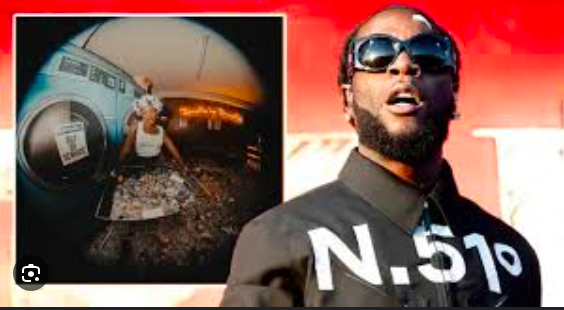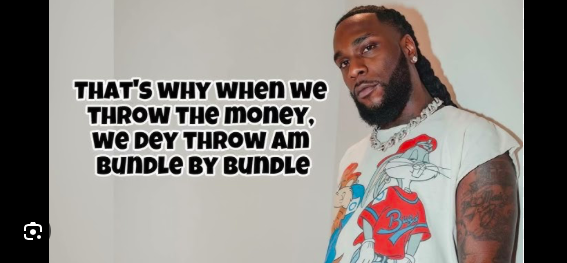You might think that Burna Boy flaunts with this track but does he really? From the outset, Burna Boy positions himself as a figure of authority and mastery with the line “When it comes to class, I be teacher.” This metaphor immediately frames him not just as a participant in life’s game but as someone who’s mastered the rules and is now schooling others. The idea of “Chop this life, make e no chop you” is a vivid piece of street wisdom—urging listeners to live life proactively so it doesn’t overwhelm them. This sets a tone of resilience and savvy survival from the start.
The reference to “Half a million dollars, when I smile for the picture” showcases his success and status. Unlike many who flaunt their wealth overtly, Burna Boy’s choice to say “That’s why I don’t put no ice in my liquor” is a subtle flex, suggesting that his wealth is so genuine and cold that he doesn’t need to artificially cool his drink. This line blends bravado with a nuanced cultural confidence, highlighting authenticity over superficial display.
The recurring Yoruba phrase “Ọgbẹni, igbẹ mi l’ọn ko,” which translates roughly to “Sir, my pockets are heavy” or “My hands carry bundles,” functions as the song’s mantra. It reinforces the central theme of abundance and affluence, punctuating each chorus with a catchy affirmation of financial power. The repeated phrase “’Cause when we throw the money, we dey throw am bundle by bundle” is both celebratory and defiant—a proclamation of his ability to spend lavishly without concern, emphasizing scale and the sheer weight of his success.
Burna Boy’s commentary on social dynamics comes through clearly in the lines “Mo k’ọwọ s’oke, but I no see their hand / Mo ni ko jẹun s’oke, but I no see your hand.” He highlights a recurring frustration: despite his outreach or ascent (“raising my hand”), he feels the lack of reciprocation or support from others. There’s an implied critique of fair play and loyalty here, suggesting that not everyone is equally invested or trustworthy. The call “Higher, higher, eh-eh, make Devil shake” acts as a rallying cry for continued elevation, both materially and spiritually, while invoking a spiritual battle against negativity or envy.
The playful and rhetorical question “Are you jonzing?” brings a layer of skepticism—challenging anyone who doubts his authenticity or intentions. “Jonzing,” colloquially, means messing around or acting foolishly, so Burna Boy is calling out naysayers or fakes who may be playing games with his success.

Throughout the verses, Burna Boy mixes cultural references and everyday realities. The mention of eating akara when moin-moin isn’t available grounds the song in Nigerian street culture. It’s a metaphor for being content with what’s at hand, suggesting resilience and adaptability: “As long as e full my belle, me I’m okay.” This juxtaposition between humble origins and high living underscores the duality of his journey.
“Vanity, everything na vanity” is a philosophical nod to the fleeting nature of material wealth and earthly pursuits. Burna Boy acknowledges that despite the piles of money (“Bundle, bundle, bundle by bundle”), there’s a deeper truth that material success can be hollow if not balanced with meaning.
The metaphor “Lion no dey humble for jungle” situates Burna Boy as a dominant force in his domain—unapologetic, confident, and ruling his environment. This is a declaration of sovereignty and freedom to “do as I wan do,” encapsulating the spirit of independence that runs through much of his work.
The line “Get my cana from Toronto / Jẹ k’ọn ma lọ jumbo by jumbo” indicates his global reach—‘cana’ meaning alcohol or pleasure—and the ease with which he moves between worlds. It’s a nod to diasporic connections and international lifestyle, extending his narrative beyond Nigeria.
When Burna Boy repeats “O dẹ mọ tungba, today na today / Small things wey them see, wọn ti n kigbe, ‘Mo gbe,’” he acknowledges his rise from humble beginnings to prominence. The phrase “Mo gbe” literally means “I am lifted” or “I have risen,” celebrating personal triumph and the validation of his efforts.
A spiritual undertone comes in lines like “I always like to say the truth and shame the Devil” and “Omo jah Jehovah,” showing that despite the material focus, Burna Boy grounds himself in faith and honesty. This balance between earthly success and spiritual integrity is a recurring motif.
The candid admission of hustle despite fame—“Hundred thousand people when I pull up for the venue / Why e be say I still dey hustle wellu-wellu / When I get money like Tony Elumelu?”—exposes a nuanced truth about celebrity life. Even with wealth comparable to one of Africa’s richest businessmen, Burna Boy embraces the grind, highlighting that success doesn’t mean complacency.
The chorus’s constant return to “Bundle by bundle” reinforces the overwhelming magnitude of his achievements and lifestyle. It’s not just money—it’s piles, weight, and quantity. It’s an emblem of status but also an assertion of pride and resilience in the face of doubters.
In essence, “Bundle by Bundle” is a layered track that balances boastful displays of wealth with reflections on authenticity, community, spirituality, and persistence. Burna Boy navigates between the physical and metaphysical, blending Yoruba culture with global references, crafting a confident anthem that is both grounded and aspirational.
Added by
Lyricssphere
WRITE A COMMENT
WRITE A COMMENT


Cumhuriyet su kaçak tespiti
July 4, 2025 at 12:16 pm
Cumhuriyet su kaçak tespiti Hızlı ve güvenilir bir hizmet sundular. Teşekkür ederiz! https://www.americanmlbforum.com/read-blog/5332